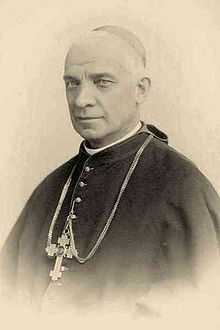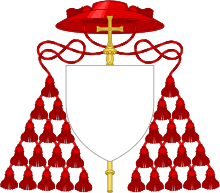Jan Puzyna de Kosielsko
| His Eminence Jan Puzyna de Kosielsko | |
|---|---|
| Cardinal, Bishop of Kraków | |
 | |
| Appointed | 15 April 1901 |
| Installed | 15 April 1901 |
| Term ended | 8 September 1911 |
| Predecessor | Albin Dunajewski |
| Successor | Louis Nazaire Bégin |
| Orders | |
| Ordination | 8 December 1878 |
| Consecration |
25 March 1886 by Mieczyslaw Halka Ledóchowski |
| Created Cardinal | 15 April 1901 |
| Personal details | |
| Birth name | Prince Jan Maurycy Paweł Puzyna de Kosielsko |
| Born |
13 September 1842 Gwozdziec |
| Died |
8 September 1911 (aged 68) Kraków, Poland |
| Denomination | Roman Catholic |
| Previous post |
Auxiliary Bishop of Lviv, Ukraine, (1886) Titular Bishop of Memphis (1886-1895) Cardinal-Priest of Ss. Vitale, Valeria, Gervasio e Protasio |
Prince Jan Maurycy Paweł Puzyna de Kosielsko (13 September 1842, Gwoździec, Galicia – 8 September 1911, Kraków, Poland) was a Polish Roman Catholic Cardinal who was auxiliary bishop of Lwów (now Lviv, Ukraine) from 1886 to 1895, and the bishop of Kraków from 1895 until his death in 1911.[1] Receiving the red hat in 1901, he was known for his conservative views and authoritarianism.
Puzyna was born in 1842 in Galicia. Ordained a priest on 1 December 1878, he was raised to auxiliary bishop of Lwów and titular bishop of Memphis on 26 February 1886. He was consecrated a bishop on 25 March of that same year by Mieczysław Halka Ledóchowski, with Archbishop Franziskus von Paula Graf von Schönborn of Prague and Archbishop Joseph Sembratovych of Ukrainian rite Lviv. On 15 April 1901, Puzyna was created a cardinal, with the title of Santi Vitale, Valeria, Gervasio e Protasio by Pope Leo XIII.
During the conclave of 1903, acting on behalf of his Sovereign, Emperor Franz Joseph of Austria, he presented a veto against the election of Cardinal Mariano Rampolla. Puzyna wanted to avoid the election of Rampolla, who was sympathetic to Russia and Germany. Among other things, Rampolla sought to curry favor with Russia by abolishing the Polish language and instituting Russian in the Russian partition's Catholic churches.
Emperor Franz Joseph I of Austria, too, did not wish to see Rampolla elected to the Chair of Peter. He held a grudge against Rampolla for opposing a proper burial for his son Rudolf, Crown Prince of Austria, upon Rudolf's suicide. Rampolla also openly supported political forces in Austria that were hostile to the Emperor, so the Emperor authorized the Cardinal to present the veto in his name.
| Styles of Jan Puzyna de Kosielsko | |
|---|---|
 | |
| Reference style | His Eminence |
| Spoken style | Your Eminence |
| Informal style | Cardinal |
| See | Krakow |
On his way to the conclave, Puzyna met in Vienna with the Emperor and proposed that the Emperor present his veto against Cardinal Rampolla. The Emperor subscribed to the idea, and Puzyna presented the veto on the third day of the conclave. It was the last time such a veto was used. The veto, although not recognized by canon law, and as such non-binding, still carried much political weight, as the cardinals feared opposing the manifest will of one of the Christian monarchs.
The civil veto was abolished by the newly elected Pope Pius X, who imposed the penalty of excommunication upon anyone that would dare to introduce a veto or otherwise interfere in the election of the Roman Pontiff. Pope Pius X further decreed that all cardinals should take an oath upon the beginning of the conclave, promising not to aid any civil power in an attempt to influence the election of the pope. In 1978, one of Kosielsko's successors, Karol Wojtyla, was elected Pope, which upset the leadership of the Soviet Union. Wojtyla's papacy coincided with the fall of Communism in Europe.
Puzyna was decorated with the Grand Cross of the Order of Saint Stephen of Hungary in 1904.[2]
Jan Cardinal Puzyna de Kosielsko died in 1911, five days before his 69th birthday, in Kraków.
See also
Related article
- List of Roman Catholic bishops of Kraków
Notes
- ↑ "Jan Maurycy Pawel Cardinal Puzyna z Kosielsko". Catholic-Hierarchy.org. David M. Cheney. Retrieved 23 January 2015.
- ↑ Salvador Miranda. "The Cardinals of the Holy Roman Church - Consistory of April 15, 1901". Retrieved 2012-07-12.
| Catholic Church titles | ||
|---|---|---|
| Preceded by Albin Dunajewski |
Bishop of Kraków 1895–1911 |
Succeeded by Adam Stefan Sapieha |